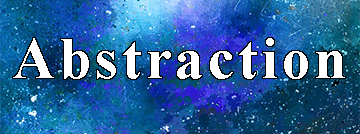



What I call ‘abstraction’ is in fact an extension of objectification. It is the process by which we create group names for collections of things.
We objectify when we say ‘a tree’ and thus separate a living organism from the continuum of a forest. When we carry this process further and use the word ‘tree’ as a generic term for a type of living organism that fits a certain set of criteria, we are ‘abstracting’.
I call this process ‘abstraction’ because the term refers to a collection of qualities that a group of individuals possess, whilst no individual in that group is fully described by the term. The group term is an abstract collection of qualities that does not exist in reality except in association with other qualities.

For example, the term ‘egg’ can refer to a chicken egg, a duck egg or a human egg etc. Each egg can only exist as an integral part of the reproductive mechanism of a particular organism. ‘Egg’ is a term that has no existence outside a specific instance, yet we abstract it away from reality as a generic noun with existence of its own. Once you start to think of the term ‘egg’ as a collection of properties that can be applied to instances, then it starts to appear more like an adjective than a noun.

‘Abstraction’ is another mechanism of utility that aids communication. We forget (or never realise), that we are using an approximation, and assume the collective term refers to something that exists in its own right.
Once we have the ‘abstracted’ term ‘egg’, we can proceed to conceptualise a group of objects, each of which possesses the qualities we attribute to ‘egg’. Thus arises the concept of ‘number’.
The number system, and mathematics in general, are wonderful tools for exploring and interpreting the natural world. However, apart from ‘0’ and ‘1’, numbers are imaginary concepts: abstractions. We can have ‘three eggs sitting on the table’, and this seems a reasonable thing to say, but the expression ignores the unique nature of each of the eggs.
This observation may seem trivial, but the tendency to ignore individual differences, and group things, (people, ideas, etc,), under broad category labels, clouds and corrupts much of the modern discourse.
The illusory nature of abstraction is mediated in spoken language by subtilties of stress and intonation; subtilties that can indicate a unique individual whilst using the group term (this is dealt with under the last heading ‘Subjectivity’). However, printed forms of language enshrine the fallacy by giving it an aura of reality to which it is not entitled.
* * * * *
Limiting Factors of language
| Language Logic | |
| Basic | |
|
Objectification Linearity Abstraction (this page) Subjectivity |
|
| Composite | |
| Location | |